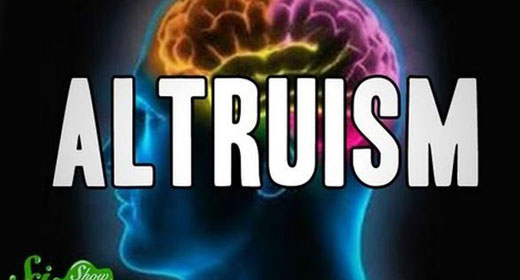The world of humanitarian aid offers little time for reflection…

Often, aid workers move from crisis to crisis, with barely a moment to absorb the lessons from their last posting before they are confronted with a fresh new disaster in a different land. For Tony Vaux, former coordinator of Oxfam’s global emergency programs who spent twenty-seven years with the organization, reflection came only after the fact. Upon leaving Oxfam to pursue life as an independent consultant, he began to consider both the personal motivations that had driven him and many of the people he worked with, and the larger picture of aid, with its multi-layered demands and agendas. The result was a book, The Selfish Altruist, which rigorously examines the many aspects of relief and development programs.
As Vaux makes clear, simply wanting to help does not absolve aid workers of their internal prejudices, assumptions, and judgments. Such baggage accompanies them into the field, and can cloud their reasoning and affect their decisions, particularly when they remain unaware of it. Further, without a clear understanding of the cultures they are attempting to assist, humanitarians run the risk of applying western values to distinctly non-western situations, occasionally with disastrous results.
Having personally witnessed some of the greatest global crises of our time, Vaux speaks with authority on the increasing role of government in foreign aid, the need for greater understanding among the public, and the tenuous balance between relief efforts and developmental goals. After spending his early years in Ethiopia, Somalia, Mozambique, and the Sudan, he later focused his efforts on the Balkan crisis and Eastern Europe. He spoke with SuperConsciousness Editor-in-Chief Heidi Smith about what he has learned through his many experiences addressing the impacts of war, famine, and societal upheaval.
SC: How do you see the difference between people who become aware of a disaster and are motivated to go do something about it, versus people who see exactly the same thing and have a momentary feeling of dismay, and then change the channel?
TV: I always had this strong feeling about injustice in the world and the inequality between people who have lots, almost more than they need, and people who have nothing. That offends me. My brother, who’s had obviously a similar upbringing and education, has never shown any interest in those issues. It does seem to be a very individual thing. Some people react more to the suffering of other people and feel that they have to do something about it. Other people perhaps are more able to gloss over that and say, “Well, there’s plenty of that around.”

SC: It seems like most people have a filtering mechanism that comes up with all the reasons not to help, but altruistic people don’t. Have you encountered that?
TV: That’s certainly true in my case. I kind of drifted around after University and went into banking, and I think the more I realized how pointless that was (for me), the more I felt there was nothing else I wanted to do except to address some of these issues of injustice.
But the people I work with come from a range of different motives. There’s no single driving force, and it’s changed over time as well. When I first joined Oxfam there were a lot of people who had worked in colonial times and who felt a sense of responsibility, almost as a duty. That’s changed into people who felt that the world should be a better place in my generation. I joined Oxfam in 1970, and I think we were still in that era when a lot of people who had been at University felt they wanted to do something about the state of the world. Later on more business-oriented models came in, and aid itself became more like a business through the 80’s and 90’s, and that’s what it remains today.
 |
| Ethiopia |
SC: What are some of the surprising attitudes that people may discover in themselves once they get into this kind of work?
TV: The motive of helping other people does imply at the root of it a sense that “I am superior,” I’m “the donor.” The other person is “the recipient.” It’s a fundamentally unequal kind of relationship that you start off with, and it’s very easy to fall into the view that, because I’ve got lots of money and I can talk about policies and decide between people, that I and my culture and my organization and everything around me is in some sense superior. It’s very hard to avoid that, especially when you’re working with people who have very, very little. It’s quite hard to keep arguing with yourself that those people have the same intelligence and the same emotions and reactions.
I think very few agencies would really seriously claim that they can demonstrate neutrality. That’s one of the reasons why aid has become so much more difficult, because there isn’t a clear path anymore.
The situation that really brought that home to me was the wars in the Balkans, dealing with people who had lived a life very similar to the life I was leading – the same kind of countryside, the same level of affluence or at least similar, and yet suddenly their whole society has collapsed around them. They’d never expected this to happen. And that made me think a lot more that such a thing could happen in our own society. Those kinds of reflections help you realize that there isn’t a difference. It’s just that some of us are in a luckier position than others.
 |
| Ethiopia |
SC: How does an insistence on viewing people as victims blind aid workers to the realities on the ground?
TV: In Mozambique, for example, I just assumed that everybody was completely helpless and that everything had to be flown in from outside to help them. I made the usual mistake of not realizing that the reason people lacked food was not because there was no food around but simply because they couldn’t get at it, and I was really shocked to discover that there was a warehouse in the middle of this town full of starving people where the government was keeping food that it had collected from farmers the previous year. Because of the war, the government couldn’t get this food out, and it was meant to go to the markets in the cities. But somehow it had never been thought of that this food should be distributed to the people who were starving. Aid agencies like Oxfam were making desperate efforts to try and bring food in. I think we were even flying it by airplanes, when what we should have done is found out what was available and made some negotiations to get the food to people who needed it, which I think could have been done. I’d been visiting Mozambique for two or three years during the war before I actually realized that this was true.
Often, actually famines aren’t what you think they are. They are political events, and in the case of Ethiopia, where I also did a lot of work, the main political event was the war going on. The war just messed everybody up completely, and then the people couldn’t get to the places where there was food to buy it. So this idea of people being innocent but helpless victims makes you actually stop looking for the political realities of the situation. It goes back to a kind of almost racist view that other people’s lives are a lot simpler than ours. If food didn’t appear here, we wouldn’t immediately assume that there was no food available. We would just say, “Oh, there must be some transport problem or something like that.” It’s the same in other countries. Actually it’s nearly always a political problem, not some “Biblical” crop failure.
 |
| Katrina |
SC: It seems like some of the really practical solutions that you mentioned, like charging the people who can afford it for food, are untenable in the eyes of donors.
TV: In a famine situation, I think you can usually buy food. But we get stuck on bringing food aid in partly because of the reasons we’ve just been talking about, but also, of course, the food aid is a way of getting rid of surpluses from Western countries, especially the USA. So aid workers often go into a situation saying, “How can I use food aid here?” rather than asking whether food aid is necessary. We actually come with a lot of baggage about how donors prefer to work, following self-interested policies like subsidizing farmers in the West, rather than doing what’s needed on the ground.
It was the closeness between the military and the aid agencies that was really the big turning point from Kosovo. We had a situation in which Oxfam’s staff were associated with the British military forces that were, in fact, bombing an office associated with Oxfam in Serbia.
SC: The NATO operations in Kosovo were a turning point in the relationship between humanitarians and governments with agendas. How did that change the world of aid?
TV: It showed that Western powers after the end of the Cold War were now beginning to intervene very, very actively and militarily in various situations, and linking that to humanitarian or good government kind of objectives. That put them exactly in the same territory as the aid agencies. It was the closeness between the military and the aid agencies that was really the big turning point from Kosovo. We had a situation in which Oxfam’s staff were associated with the British military forces that were, in fact, bombing an office associated with Oxfam in Serbia. That made me realize that aid agencies have always been close to donor governments, but up until now the donor governments had not really been intervening in these situations. Now we as agencies that make use of their money and resources find ourselves tied to their objectives, and of course this became a huge issue in Afghanistan and Iraq, where the aid agencies could not distance themselves at all from whatever the West was trying to do, and actually became a target for attack from local people.

| Katrina |
C: Could you describe the fine line between attachment and detachment in these kinds of situations, particularly in terms of the issue of neutrality?
TV: The theory of neutrality has a big history from the Red Cross movement, but it was very convenient during the Cold War, because if aid agencies wanted to operate in a country like Ethiopia, which was dominated by the Soviet Union, you didn’t want to be seen as part of the West. So, we claimed neutrality and tried to focus on humanitarian needs, in order to make sure that we had access to those areas. It worked very well, and aid agencies were able to operate all over the place during the Cold War. After the end of the Cold War, it became very difficult to sustain, because you couldn’t really detach yourself from the government of the country in which you worked and lived. Although aid agencies tried to claim neutrality, it didn’t really wash, because in nearly all cases they were accepting money from those governments, and they were not speaking out against whatever that government was doing. Although neutrality is still regarded as a good idea, I think very few agencies would really seriously claim that they can demonstrate neutrality. That’s one of the reasons why aid has become so much more difficult, because there isn’t a clear path anymore.
SC: Could you describe the tensions between the development and relief factions that you observed in the world of humanitarian aid and how those relate to gender?
TV: This deep division between the development type of people and the relief type of people is very fundamental in aid. They’re almost like two tribes or cultures among aid workers. Some people are more in favor of immediate results, and they’re in the relief faction. Then there are the people who focus on long-term change, the ones who talk much more about changing society; they’re the more political dimension. There is a gender aspect in that quite a lot of the immediate relief tends to be men, and the long-term development tends to be women. From an organizational point of view, you want these two groups to work together and to be able to coordinate their activities, but it’s actually people with totally different values.
 |
| Darfur |
One of the most difficult things to do is get these two groups to work with each other, and that resulted in some pretty tragic results. We had a situation in Ethiopia in 1984 where the office had gone over to a totally developmental mode and really hated the idea that lots of relief workers would come in, and so they tended to hide evidence of the famine that was developing in 1984 until too late.
SC: In Afghanistan Oxfam took a stand about the status of women, but this also had some fallout. What has been the long-term effect of that situation?
TV: Oxfam had taken responsibility for a massive water supply in Kabul. It was supposed to supply about 10,000 people, and Oxfam wanted to involve women in that program. But the Taliban was in charge at that time and wouldn’t allow women to participate, so Oxfam closed the program completely. They also didn’t want any other organization to continue the program, because Oxfam wanted to persuade the Taliban to be more open towards women. So, it all sounds like very good, high-principled action, and it became very important in Oxfam at that time, because there was a battle going on to establish a gender unit in Oxfam and to establish gender as one of Oxfam’s main focuses.
At the time of the tsunami, everybody very generously gave lots and lots of money, but really the tsunami wasn’t the main need even at that time. It was just that it had by far the biggest media profile, and the images were of a type that attracts public donations.
All this played out over the issue of a water supply in Kabul. An evaluation was done a year or two after the program was closed which raised the issue: by not supplying this water, Oxfam had led to quite a significant number of deaths, because people had to drink contaminated water, and there’d been a lot of outbreaks of diarrhea and diseases of that sort. Obviously it’s a good thing to have principles, but ultimately you can’t stand by one principle alone. In the aid world in particular, principles are always competing with each other, and the principle of involvement of women is an important one, but the principle of saving lives in a desperate humanitarian situation is probably more fundamental.
 |
| Somalia |
SC: What is the role of self awareness in humanitarian aid, and how does it apply to altruism?
TV: I wrote [The Selfish Altruist] largely as a reflection on my experience. I’d been working in this field for about twenty-five years at that point, and I had constantly moved on from one crisis to another, or one area of work to another, and never had the chance to reflect on these things, and yet I felt uneasy about my experiences. Just at the point when I was beginning to learn something, I’d move on. You do need time for reflection, and that’s a big difficulty for aid workers, because they are always moving on. It’s only by reflecting on things and having a certain amount of time that you develop the self-awareness to realize where you were allowing your personal or organizational preferences to get in the way of altruism, meaning really focusing on the person in need.
Self awareness is important in organizations, and the implication is that people should have more time for that self-awareness process. Another track is to encourage more questioning among aid workers of each other and more learning processes. If, say, one group of aid workers comes to look at the work of another group, more collective methods of self awareness may be possible. I generally find that processes like peer review are much more effective and lead to much more learning and change than evaluations.
Often, actually famines aren’t what you think they are. They are political events, and in the case of Ethiopia, where I also did a lot of work, the main political event was the war going on.
SC: Ideally what would be your vision for the future of aid?
TV: My main concern is that aid should remain honest and truthful to its own roots and objectives, and I do feel that sometimes it needs to be more challenging towards the people who support it, the public and the bilateral donors. At the time of the tsunami, everybody very generously gave lots and lots of money, but really the tsunami wasn’t the main need even at that time. It was just that it had by far the biggest media profile, and the images were of a type that attracts public donations. Because people gave so much money for the tsunami, the aid agencies put all their best people and efforts into the tsunami response. But all of the people who were killed by the tsunami were already dead. There was a huge reconstruction process, but it wasn’t exactly life saving. It was just a longterm development process, whereas at the same time people were still dying just for lack of food and medicine in the Congo. That showed me that the aid agencies can get swept along by the way the public works.
Similarly, they can get swept along by the donor governments, like they’ve been swept along into Iraq and Afghanistan. I’d like the aid agencies to be prepared to stand up when they think they’re being swept aside by what are ultimately rather selfish rather than altruistic forces. In terms of vision, I’d say the main thing is to keep truthfulness and keep questioning people who support aid. I do worry that the public generally doesn’t know a lot about aid and the issues concerned with it, and so if you simply follow public opinion and what people will give money for, you will end up with a rather distorted aid picture.
Finally, aid itself should be more globalized now, but it still looks a sort of small group of Western agencies dominating it. There are now very good non-government organizations in practically every country around the world, and those organizations really should be moving forward into the front lines. One of the challenges is to stop aid from being quite so much of a Western project and have it become a more global one.














































